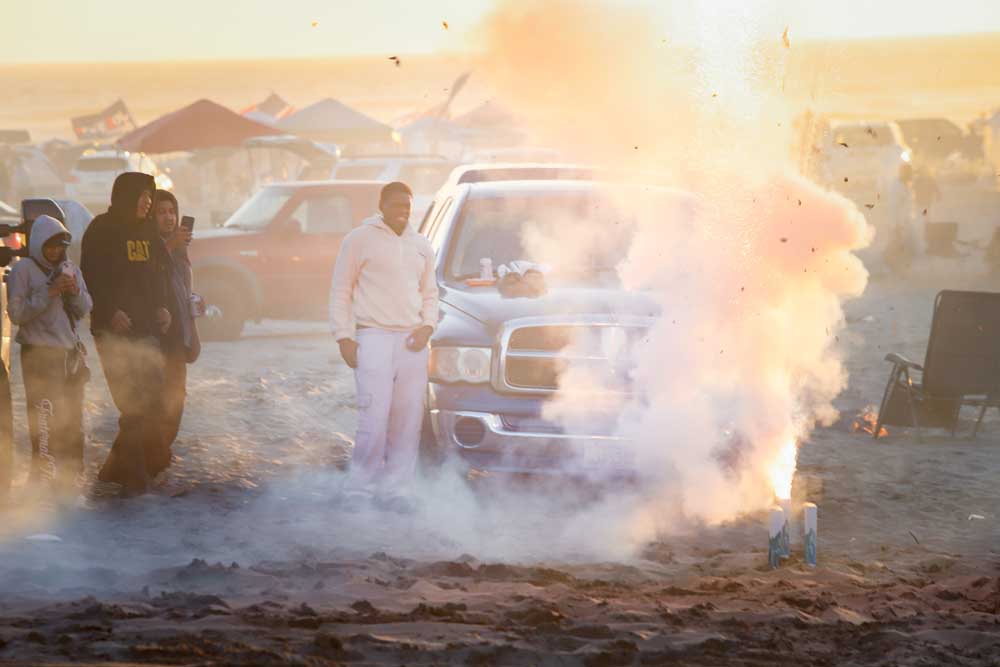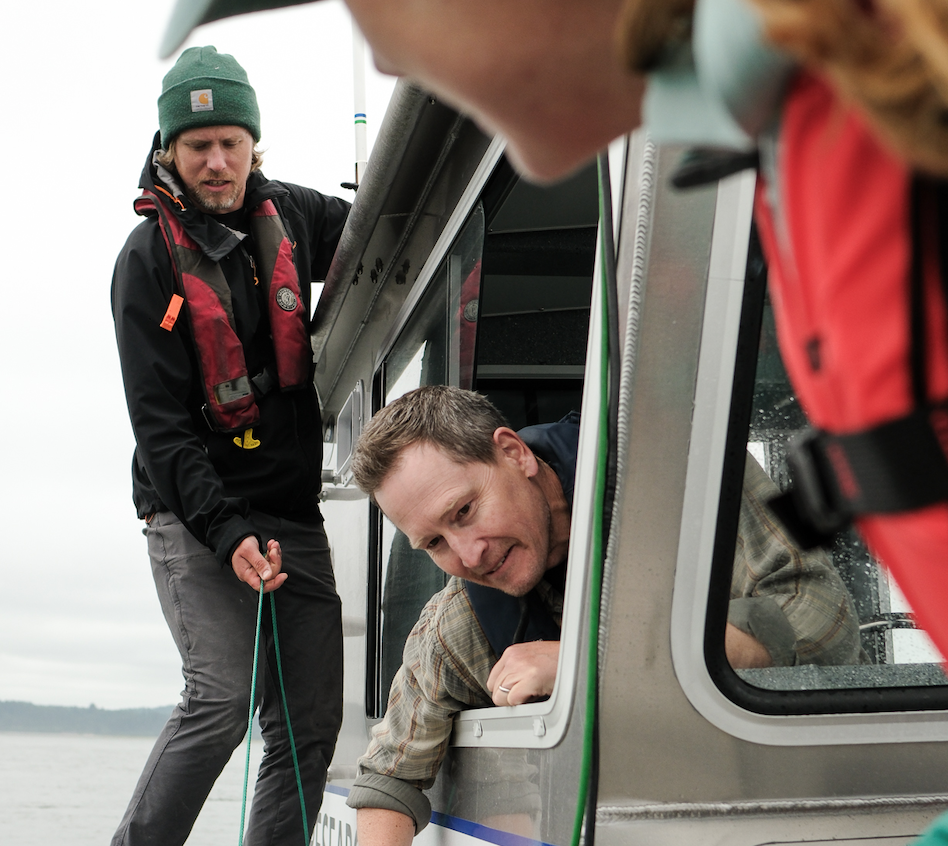Coast Chronicles: Stand and fight, or flee?
Published 10:07 am Monday, August 5, 2024

- When does tourism become “overtourism” — crowds that seriously detract from local quality of life? A columnist suggests that the peninsula’s July 4th has become such a phenomenon.
Stand your ground?
This past week I spent some time with a dear long-time friend. We lived just a block away from each other and went through first grade all the way to high school graduation together. As sometimes happens, after graduation most of my childhood friends and I exploded out of the Yakima Valley to a variety of colleges around the nation. It wasn’t until some of us returned to the Pacific Northwest that we reconnected and now have stronger friendships than ever. Some friends drift away; some come in closer.
Anyway, my friend — I’ll just call her CV — and I talk about everything and this time it was politics. President Biden stepping down and Kamala Harris stepping up has revitalized those of us who don’t want a felon, con man, and racist in the White House. But … what if? My friend has been researching how to get her Canadian citizenship since her father was born and raised for his first decade in Canada. I asked, “So you might really move?” “Not sure,” she said.
This got me thinking, as most things do. Finding a place one can call home has been a conundrum for some of us. After I left Yakima, then home is … where? I’ve lived 20 years on the Peninsula and in two decades inevitably things change, some for the better, some not. But which changes are intolerable, and, if one is unsatisfied, what can one actually do? Just pull up stakes and head for another frontier?
The stand-your-ground law allows people to use deadly force in self-defense if they believe it’s necessary to protect themselves or others from a violent crime. But, as we’ve seen, it can also encourage vigilantism. I’m using this phrase in another way: I’m saying how do you decide when to stay and fight to change things in your community; and, if circumstances change, when do you throw up your hands and go elsewhere?
What can one change and how?As a journalist in this very column I’ve written about issues that I’d love to change. But I’ve lost the constitution to focus on one thing; whereas CV once made the choice to become a community activist and spent four years of her life focused solely on the problem of noise pollution in Seattle. She met with city council representatives, she spoke at PTAs, Rotary Clubs, and community organizations; she printed up cards with data about the negative effects of noise and put her phone number on the bottom — as in “Call me if you want to help.” Eventually the Seattle City Council wrote and unanimously approved a noise ordinance, which Mayor Paul Schell (serving from 1998-2002) vetoed. But CV was just ahead of her time. Now Seattle does have a strict noise ordinance, and everyone understands the importance of it.
So I ask you, how can we make change in our community? Undertaking the kind of activism that CV took on requires daily determination and commitment. I’m mentioning here four things I’ve written about over my 20 years on the Peninsula which should be changed. But how?
Keeping our trees
Our beautiful Peninsula is noteworthy for many things — fresh seafood, committed public citizens, untrammeled wild places, and a long magnificent beach — and certainly we must add the preponderance of lush forested areas. Though generally unappreciated, our greenery provides all of us environmental services: clean air and water, shade in the summer, protection from winter storms, habitat for wild creatures, and perhaps most importantly, beauty.
Trees are a big part of what attracts newcomers to our shores. Yet in far too many cases, people arrive from other states, buy property, and totally clear it — often to build more and more unnecessarily expansive (and expensive) homes and buildings (which raises local property taxes!). We are losing the reasons that we love it here, but this doesn’t have to be the case.
Maybe Seattle and other urban areas have gone too far in restricting tree removal, but our community leaders — if we pressed them — could and should be setting in place regulations that would protect our forested environment. Cutting down trees should require permitting and, at the very least, replanting. And older and magnificent heritage trees — either fruit or evergreens — should be protected.
If we don’t put these kinds of regulations in place, we will certainly end up looking like Seaside — long strips of roads scattered with rinky-dink businesses, enormous pole barns, and lots of cement. I wish we had a magical crystal ball and could look at two possible futures 20-30 years from now: one in which there is no tree protection, and an alternative in which we create ordinances to save our trees — then we could see the ultimate results and make our choices.
Governance
This brings me to something I have written and spoken about over the years and something that would take a huge but much needed essential change. Our governance structures are not sufficient to meet the needs of our communities.
Most of the peninsula’s population and a considerable fraction of our county’s budget comes from north of Cranberry Road. Yet we have no municipalities on the north end. Thus, decisions about our issues reside with the three county commissioners; and, of those three, I’d say, based on the commissioner’s territorial boundaries, we “own” maybe only one half of that one third of our county decision-makers. That’s called “Taxation Without Representation,” my friends.
If we weren’t so pleased to be living in such a beautiful place, we might be appropriately outraged.
Light pollution
This is a less pressing issue but something I mention from time to time as a missed opportunity. It is probably not too late now to do something about it.
We could have light ordinances — they aren’t officious — that would reduce light pollution on our Peninsula. Many small rural areas like ours have benefited from a Dark Sky designation that allows folks to visit to look at the stars.
It’s simply another kind of tourist attraction that a forward thinking visitor’s bureau in conjunction with some new county light regulations could make possible.
Fireworks and ‘overtourism’
And while I’m on the subject of tourism, fireworks! Many places from Venice to Hawaii are now putting in restrictions on the number of tourists that can visit, with the idea that this increases the quality of both tourists and tourism. (Google “overtourism” — a newly-adapted word — and you’ll find lots of recent articles on this concept.)
As I’ve written about frequently, on the Peninsula we are victims of overtourism, particularly as it relates to the Fourth of July. It certainly doesn’t apply to everyone but unfortunately many out-of-towners arrive on the July 4th week to destroy peace of mind and our beach. They dirty it with firework remnants, abandoned campfires, furniture, snack and meal litter, and, of course, noise. This crassness and pollution has been excused for far too long by our governing representatives.
In the cases mentioned above, certain kinds of tourism are banned; or alternatively, an extra tourist fee is assessed to cut the tourist numbers and mitigate the damage created to the environment and infrastructure. I’ve not seen anywhere a true accounting of the amount of money spent here for either fireworks or tourism revenue compared to the costs of clean-up, policing, fire department or emergency services involvement; or a real assessment of we the people who are asked to put up with this.
At the very least, a substantial clean-up fee could be assessed for purchases of fireworks over a set amount, to be returned to local authorities. Or, better yet, shut fireworks down and cater to visitors in other family-friendly ways. We should demand tourism options that enhance our riches, not diminish them. And we locals shouldn’t have to vacate our homes while strangers desecrate what we love.
I am, again, suggesting areas that need attention. When will our officials wake up, or will the champions of change have to come from the grassroots as they have for teen suicide prevention, firework bans, homelessness, and other concerns. What will light a fire under the decision-makers of our county? Do we stay and fight, or do we move to another community?
Change must happen.
• • •
Note: Brian, our north end produce guy, is back at it with a little help from his family. Stop by and say hi.









